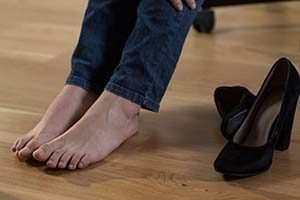Contact us today.
Why you shouldn’t Ignore Leg Swelling
As a young man I remember visiting with my Grandparents and noticing how much my Grandmother’s legs and ankles swelled by the end of the day. She would sit in the chair and rub her feet and ankles. The swelling was quite pronounced and I know it was both uncomfortable and painful for her. At that time, the only treatments that were prescribed to her were wearing compression hose, taking water pills (diuretics), and keeping her legs elevated as often as possible.
 Leg swelling that is caused by the retention of fluid in leg tissues is known as peripheral edema.
Leg swelling that is caused by the retention of fluid in leg tissues is known as peripheral edema.
Leg swelling that is caused by the retention of fluid in leg tissues is known as peripheral edema. If you experience swelling after sitting or standing for a long time, or if your swelling generally tends to get worse as the day goes on, your leg swelling may be peripheral edema, and problems with the circulatory system, the lymphatic system or the kidneys are all potential causes.
“If you notice swelling in your legs, ankles and feet, it’s important to understand what might be causing it. Especially if you see discoloration in the skin or open sores that don’t heal properly or quickly. And that means getting an accurate diagnosis” comments the Medical Director of Vein Specialists of Illinois Dr. Stephen Sorenson. “Edema (swelling) can be caused by many things, some of which are indications of life threatening illness and disease.”
Accurate Diagnosis
Your primary care physician will need to become something of a detective. They may already know or will ask you about your medical history and any recent changes in your health condition. Do you have heart problems, kidney issues, any arthritis? Any new medications? How well and long do you sleep at night? Are your legs elevated when you are at rest? Are you overweight? Do you eat a large amount of salt? For women; do you notice that your condition changes with your menstrual cycle or are you pregnant?
As with any diagnosis, it is often a process of intelligent observations and the process of elimination.
Chronic Venous Disease
There may come a point where you and your primary physician have ruled out inflammation as the cause of the swelling, and from there if problems with the lymphatic system or the kidneys can be ruled out, the most likely problem is your circulatory system. Chronic venous disease or chronic venous hypertension is one of several different circulatory issues that could be contributing to your leg swelling
Chronic venous disease is often overlooked by primary and cardiovascular care providers because of an underappreciation of the magnitude and impact of the problem.And the problem with Chronic Venous disease, according to Robert T. Eberhardt, MD; Joseph D. Raffetto, MD in their recent article on Chronic Venous Insufficiency American Heart Association Journal is that: “Chronic venous disease is often overlooked by primary and cardiovascular care providers because of an under-appreciation of the magnitude and impact of the problem.”
Add to this that it is estimated that in America, 72% of women and 42% of men will experience varicose veins by the time they are in their 60s, and this becomes a significantly under-diagnosed medical condition.
Duplex Doppler Ultrasound
In the case that your primary care physician has referred you to the Vein Specialists of Illinois for testing, or if you are seeking a second opinion because you are dissatisfied with the current treatments for your leg swelling, we will begin by conducting a thorough evaluation of your legs using Duplex Doppler Ultrasound exam to determine if you are suffering from varicose veins.
A Duplex Doppler Ultrasound exam evaluates the veins inside the leg and is the only way to accurately diagnosis venous reflux (improperly functioning veins). The results of these ultrasound exams are combined with information from a thorough physical exam and medical history to give Dr. Sorenson a complete picture of the venous system as a whole. This not only allows a treatment plan to be tailored to the unique needs of each patient, it also educates patients to their own condition, making them an informed partner in the process.
Prognosis
Untreated Chronic Venous Insufficiency (varicose veins) does not improve over time and there is no known cure that will return a compromised varicose vein to healthy performance.
Early signs of venous insufficiency may include development of spider veins (less than 1 mm in diameter), reticular veins (1-3 mm in diameter), or small varicose veins (over 3 mm in diameter). Other signs include swelling of the ankle at the end of the day, tenderness near the ankle, or pain in the legs with prolonged standing.
More severe venous insufficiency may cause enlarging varicose veins, worsening swelling, pain, tenderness, venous stasis skin changes, venous leg ulcers, and deep vein thrombosis.
Schedule Your Appointment Now!
Millions of adults in the United States suffer from varicose or spider veins, yet only a small fraction seek help. Don’t spend another day wishing for pain-free, healthy legs. Relief is just an appointment away.
Call us today at (847) 468-9900 to Schedule a Consultation and take the first step toward healthier, happier legs.

